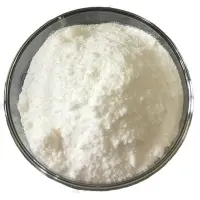-
Categories
-
Pharmaceutical Intermediates
-
Active Pharmaceutical Ingredients
-
Food Additives
- Industrial Coatings
- Agrochemicals
- Dyes and Pigments
- Surfactant
- Flavors and Fragrances
- Chemical Reagents
- Catalyst and Auxiliary
- Natural Products
- Inorganic Chemistry
-
Organic Chemistry
-
Biochemical Engineering
- Analytical Chemistry
-
Cosmetic Ingredient
- Water Treatment Chemical
-
Pharmaceutical Intermediates
Promotion
ECHEMI Mall
Wholesale
Weekly Price
Exhibition
News
-
Trade Service
9, 2020 /---MUSC Hollings Cancer Center researcher Dr. Sophie Paczesny and others recently published a new class of immunocellular biomarkers that may reveal which patients are most at risk of transplant anti-host disease (GVHD).
iso-HSCT is still the only effective treatment for leukemia," explains Paczesny, director of the MUSC Department of Microbiology and Immunology.
in HSCT, cells matching the donor are injected into the patient's blood and eventually into the bone marrow.
some of these cells differentiate into immune cells, helping to eliminate residual leukemia cancer cells that have not been killed by chemotherapy.
, however, some of the immune cells of the receptor may also attack the patient's own healthy tissue, known as graft anti-host disease.
( www.pixabay.com) GVHD affects up to 50% of patients receiving HSCT and can manifest itself in multiple organs.
about one-third of people with GVHD have localized effects in the gastrointestinal tract (GI-GVHD), which poses the highest risk of death.
Paczesny further describes this phenomenon.
for leukemia patients, the provider cells you provide have different biological or antigen characteristics than the subjects.
this is how these immune cells recognize leukemia and destroy it.
, these antigens are also present in normal tissues, especially in areas of the body with the largest microbiome, such as the intestines.
, the immune cells of the supply attack there, and the symptoms are the most difficult to treat.
bone marrow stem cells are called erythroid stem cells, which means they can mature into many different types of cells.
this includes red and white blood cells, as well as other types of immune cells responsible for balancing immunity and tolerance, such as synthesized and T-cells.
tyroblast cells are able to exchange information with T cells through antigen molecules presented in the MHC complex on the cell surface.
T cells are activated when they identify "non-self" antigens and then play a key role in triggering the body's other defenses against foreign invaders, who may include transplanted cells from different hosts.
previous work at Paczesny's lab showed that immune cell signaling path pathogenic pathogenic T-cells (Th17 cells) in the blood of these patients increased.
presence of these aggressive T-cells was associated with lower survival rates compared to patients who lacked GVHD or had lighter forms of GVHD in the skin.
unique in its ability to induce these cells' ICOS (a class of T-cell signaling auxiliary subjects).
Paczesny said.
"We're trying to understand where the activation of these T-cells comes from."
antigen presents what cells are.
"Because the ICOS ligate is located on the surface of antigen-presenting cells, such as synth cells, it can be easily detected using existing techniques, such as flow cytometers, that scan for external markers on cells in the blood."
in this way, individuals with GI-GVHD symptoms after treatment may be marked.
Paczesny's team showed an increase in the levels of degeneration cells (especially in groups called plasma cell-like dedesome cells) in GI-GVHD patients who expressed ICOS ligations compared to the control group.
, patients with high levels of these cells have a much lower three-year survival period than low-level cells.
Djamilatou Adom, a postdoctoral researcher who worked with Paczesny, further studied the role of ICOS signals in mice in GI-GVHD.
, they showed that genetic elimination of ICOS mating can protect recipient mice from GVHD-related deaths before transplanting donor mouse bone marrow cells into the receptor mice.
In addition, using "humanized" mice with non-functional immune systems, the researchers found that plasma cell-like degenerative cells that express human ICOS ligations were transplanted into these mice, whose own bone marrow had been damaged by radiation, resulting in elevated levels of Th17 cells in GVHD.
Paczesny said the involvement of plasma cell-like dedes (pDC) in GVHD was an interesting finding.
these cells, they are generally thought to be more toned, " he said.
in other words, they can reduce the severity of GVHD.
, however, if they activate T cells, for example by binding to ICOS, they become more toxic and may drive the development of GVHD.
.com Source: New Biomarker to prevent graft-versus-host disease in stem cells source: D. Adom el al., "ICOSL-plasmacytoid dendritic cells as inducer of graft-versus-host disease, responsive to a dual ICOS/CD28 antagonist," Science Translational Medicine (2020). stm.sciencemag.org/lookup/doi/ ... scitranslmed.aay4799.







